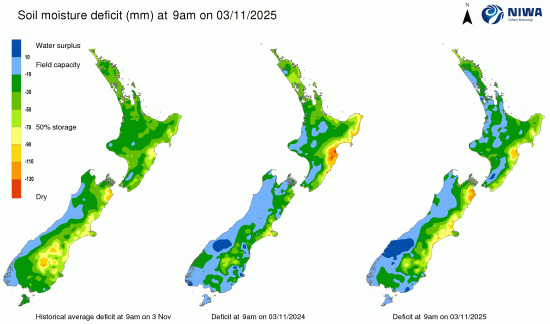Here’s our summary of key economic events overnight that affect New Zealand, with news that with the Indian subcontinent on the edge of armed conflict and tit-for-tat terrorist moves and retaliation, the world’s economy is ignoring these new risks.
First up today, the US House of Representatives is set to vote to end their latest and record-long shutdown, and by the time you read this, have probably approved the compromise. This has seen Wall Street react with a split personality. The Dow Jones Industrial Average has risen to a new record high. But the broader S&P500 is becalmed, and the Nasdaq is lower. The bond market is more risk-averse. The USD is weakening. Just guessing here, but it seems markets think the shutdown pain was a wasted exercise and the result will be negative for the giant US economy. Rebooting their economy won’t be easy.
Meanwhile, US mortgage applications were little-changed last week, with the refinance market dipping slightly and the smaller new purchase market rising, actually with a notable increase. This came despite mortgage rates rising in the week.
And more Americans than ever are falling behind on their car payments. According to Fitch Ratings, the share of subprime borrowers at least 60 days past due on their car loans rose to 6.65% in October, the highest in data tracking that started in 1994. And selling a used car to pay off the debt won’t help. Record numbers of people doing that still owe loan balances after these sales.
A well-supported US Treasury 10yr bond auction today brought a median yield of 4.02%, down from 4.06% at the prior equivalent event a month ago.
In Canada, there were more positive economic signals. Building consents rose in September from August more than expected, led by multi-family projects in Alberta and Quebec and single-family homes in Ontario. But overall, they were still -8% lower than year-ago levels.
In Japan, machine tool orders rose in October by more than +17% from the same month in 2024, driven by a +21% rise in export orders. They would have been happy about the +6% rise in orders from local manufacturers too.
In China, residential real estate developers are under pressure to generate cash – again. Meeting year-end sales targets is crucial to hold on to their finance lifelines. So there are not only steep discounts on offer, but other creative incentives, such as “move in, buy later”. One Guangzhou developer as a scheme where buyers front with a ¥100,000 deposit (NZ$25,000), move in for one month, and if they are not happy can move out with the only cost being one month’s rent.
In Malaysia, they have a buoyant retail sector with retail sales rising +7% in September from a year ago, accelerating from the +5% gain in the previous month. It was up +4.3% in volume terms and was their largest increase since January.
In India, CPI inflation there has fallen to a record low +0.3% pa, down from +1.4% in September. Driving this is -5% deflation for food. In turn, that was caused by very good food growing conditions and heavy harvests. The RBI has an inflation target range of 2%-6% and this was the third consecutive month it has been below the bottom of that target. They will likely now move to cut their 5.5% policy rate soon, maybe at their next meeting on December 5, 2025.
In Australia, the value of new owner-occupier home loan commitments rose +9.8% in September from a year ago. Investment lending for housing soared +18.7% on the same basis to a record high. The housing surge is in full flight of unbridled enthusiasm.
The UST 10yr yield is now at 4.06%, down -1 bp from yesterday at this time. The key 2-10 yield curve is now at +50 bps. Their 1-5 curve is now just +1 bp positive and the 3 mth-10yr curve is still +11 bps positive. The China 10 year bond rate is down -1 bp at 1.80%. The Australian 10 year bond yield starts today at 4.37%, up +1 bp from yesterday. The NZ Government 10 year bond rate starts today at just on 4.11%, down -1 bp.
Wall Street started higher but has turned lower as trading developed, now up only +0.2% in their Wednesday trade. European markets were up up however, between Frankfurt’s +1.2% and London’s +0.1%. Tokyo ended yesterday rising +0.4%. Hong Kong was up +0.8% but Shanghai retreated -0.1%. However Singapore rose another +0.6%. The ASX200 ended its Wednesday session down -0.2% with a late retreat, while the NZX50 was up +0.5%.
The price of gold will start today at US$4190/oz, up another +US$77 from this time yesterday.
American oil prices have dropped hard by -US$2.50 from yesterday to just on US$58.50/bbl, with the international Brent price just over US$62.50/bbl.
The Kiwi dollar is now at just on 56.6 USc, and little-changed from yesterday. Against the Aussie we have dipped -10 bps to 86.6 AUc. Against the euro we are unchanged at 48.8 euro cents. That all means our TWI-5 starts today at just under 61.2 and up +10 bps from yesterday.
The bitcoin price starts today at US$101,589 and down another -1.9% from yesterday. Volatility over the past 24 hours has been modest at just on +/- 1.8%.
Select chart tabs
US$
AU$
TWI-5
¥en
¥uan
€uro
GBP
Bitcoin
The easiest place to stay up with event risk is by following our Economic Calendar here ».

